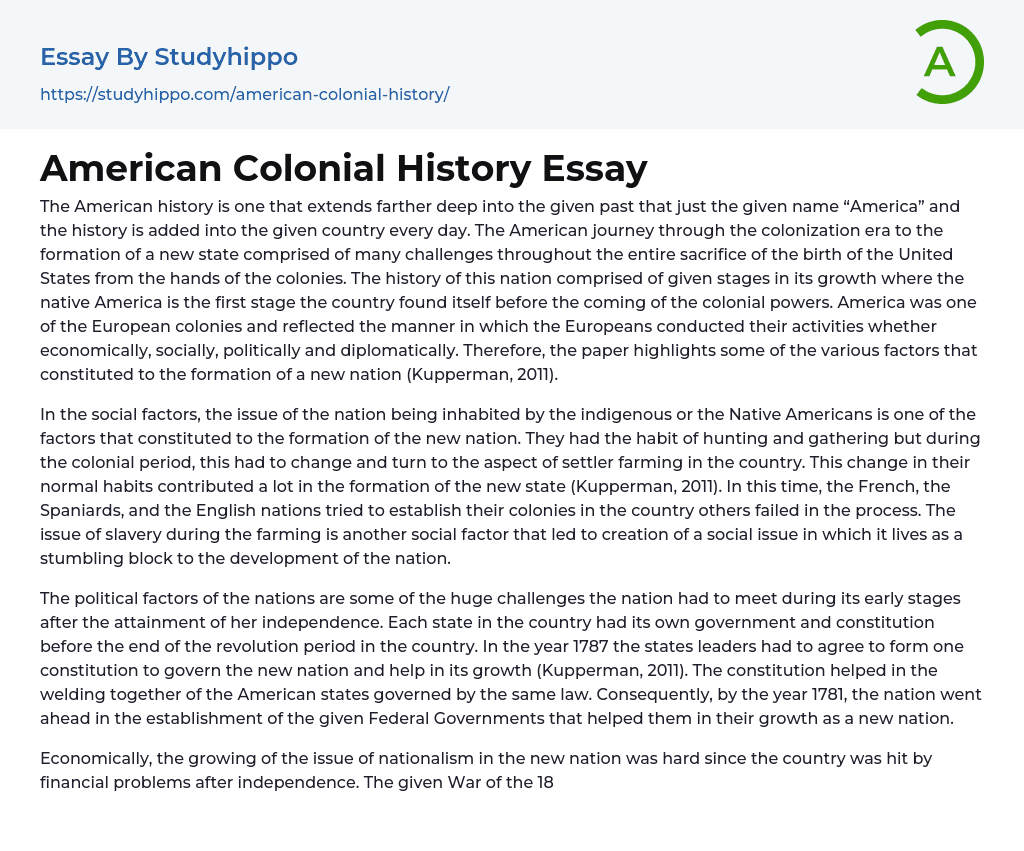The history of America goes beyond the name "America" and is continually growing. The journey of the United States, from colonization to becoming a state, was filled with challenges and the colonies' readiness to make sacrifices.
The history of this nation is composed of various stages in its development, beginning with the period when native Americans inhabited the country before the arrival of European colonizers. As a European colony, America mirrored Europeans' economic, social, political, and diplomatic endeavors. Hence, this article explores the factors that contributed to the formation of a new nation (Kupperman, 2011). Among these factors is the presence of indigenous people or Native Americans who played a crucial role in molding the new nation.
The indigenous people's hunting and gathering practices were transformed into settler farming during the colonial period, which greatly impacted the formation of the new state (
...Kupperman, 2011). Different nations like the French, Spaniards, and English made efforts to establish their colonies in the country but not all succeeded. The introduction of slavery in farming complicated social dynamics and hindered national development.
Following its independence, the nation encountered notable hurdles concerning its political aspects. Each state in the country had its own government and constitution until the conclusion of the revolution period. Nonetheless, in 1787, state leaders reached a consensus to create a unified constitution that would govern the emerging nation and assist in its progress (Kupperman, 2011). This constitution played a pivotal role in consolidating the American states under a shared legal framework. Consequently, by 1781, the nation successfully established Federal Governments that fostered its development as a new entity.
In terms of the economy, the new nation faced difficulties due t
financial problems following independence. However, the War of 1812 helped foster increased confidence and a sense of unity among the people. The subsequent peace allowed the nation to focus on agriculture and other economic activities. With the assistance of settlers and merchants, the leaders successfully governed and managed the nation's affairs, leading to significant economic progress (Kupperman, 2011).
Diplomatically, establishing positive relations with other nations was a challenge for the new nation. The United States had a responsibility to expand its economic power internationally. Through capable leadership, the nation signed treaties early on that enhanced its economic strength and contributed to its growth and development.
Therefore, America's growth and development have a longer history than what appears at first glance (Kupperman, 2011).
References
- Kupperman, K. O. (2011). Major problems in American colonial history: Documents and essays. Mason, OH: Cengage Learning.
- Abolitionism essays
- Adam Smith essays
- American History essays
- American Revolution essays
- Ancient Egypt essays
- Articles Of Confederation essays
- Atlantic Slave Trade essays
- Aztec essays
- Benjamin Franklin essays
- Civil Rights Act of 1964 essays
- Civil Rights Movement essays
- Civil war essays
- Cleopatra essays
- French And Indian War essays
- Gettysburg essays
- Great Depression essays
- Hurricane Katrina essays
- Industrial Revolution essays
- Jamestown essays
- Manifest Destiny essays
- Mccarthyism essays
- Patrick Henry essays
- Pearl Harbor essays
- Pocahontas essays
- Prohibition essays
- Pyramids essays
- Salem Witch Trials essays
- Slavery essays
- The New Deal essays
- Thirteen Colonies essays
- Westward Expansion essays
- American Civil War essays
- Atomic Bomb essays
- Attack essays
- Cold War essays
- Crimean War essays
- Diplomacy essays
- Emilio Aguinaldo essays
- Emperor essays
- Hitler essays
- Iraq War essays
- Korean War essays
- Mexican American War essays
- Nazism essays
- Nuclear Weapon essays
- Philippine Revolution essays
- Revolutionary War essays
- Rwanda essays
- The Spanish American War essays
- Trench Warfare essays




